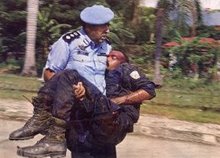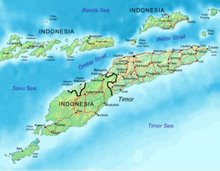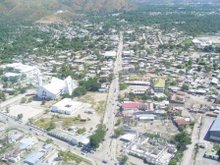Updated September 11, 2008 17:28:52
A group claiming to represent 200 former resistance fighters in East Timor is demanding financial recognition for its contribution to the country's independence struggle. Our reporter in Dili, Stephanie March, says the group call themselves "The Petitioners" - a similar name to the group of 600 soldiers who mutinied in 2006, sparking months of bloody violence.
The spokesperson for the petitioners, Anacleto Belo, has told Radio Australia's Connect Asia program the group of new petitioners represent 200 ex-commanders from the 24-year-long resistance struggle against Indonesian occupation who do not qualify for a pension."I want to ask to government to take responsibility for us," he said."We were the rebels against the Indonesian government during Suharto's time, we are not rebels against current East Timor government. "So why do those who rebel, who act against government, now have a good life? They are rebels but they get money to have a good life because they made trouble."Peaceful disarmamentAfter independence, Mr Belo and fellow resistance fighters peacefully handed over their weapons to authorities, believing the government would look after them.Current government policy says only veterans over 55, or those who fought for more than 15 years, are entitled to the pension, which can be up to $550 a month. The state secretary for veterans and national liberation, Mario Reis, says the government is working to recognise all of the nation's resistance heroes."The government has a plan based on our constitution in Article 11 which said that says we must recognise people who participated in a struggle," he said. "But many of those who can make claims are yet to because they still don't have the right documents."The government says it is developing a plan for 2009 to recognise and give financial support to veterans who were involved in the resistance struggle for more than three years.A youth worker from NGO Uma Juventude, Jose Sousa-Santos, says the petitioners could be used to help deal with the tens of thousands of unemployed and disenfranchised youth who are often blamed for much of East Timor's violence and instability."What I realise is missing in the kids in regards to identity and cultural knowledge is these role models - the examples these guys gave," he said. "Now how can I expect East Timorese youth to behave any different than the militia they have seen in '99, or the burning they have seen in 2006, if that's the only examples to them of strength of power they have seen? "They don't get to see this kind of strength, this kind of discipline."
sexta-feira, 12 de setembro de 2008
Subscrever:
Enviar feedback (Atom)







Sem comentários:
Enviar um comentário